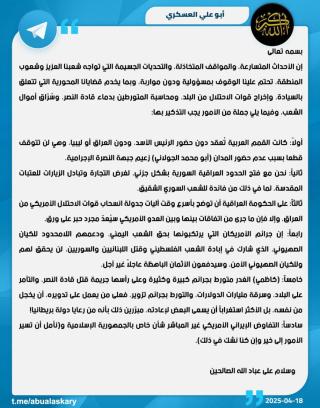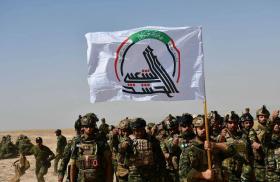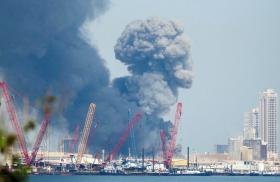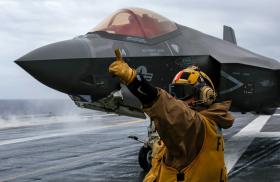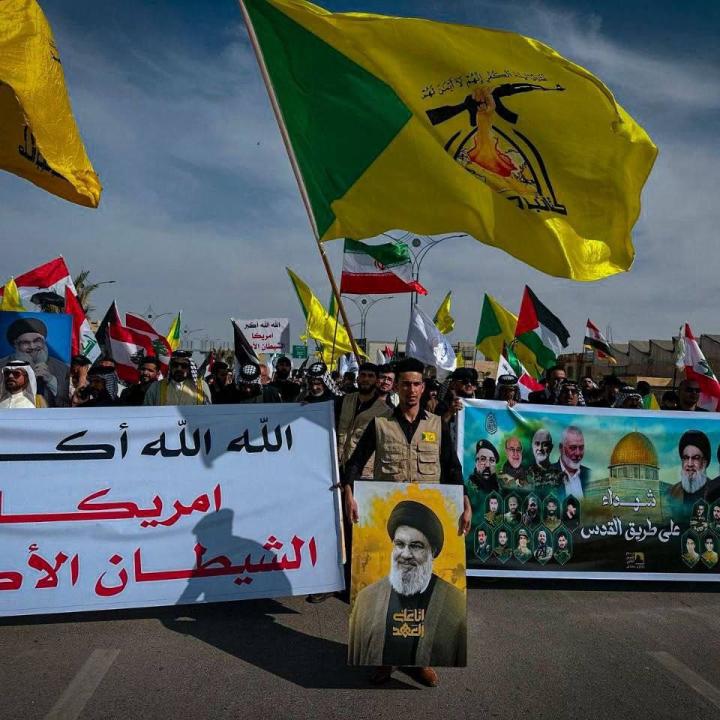
The Return of Abu Ali al-Askari

In its first statement since October, a notorious Kataib Hezbollah Telegram account offered a deeper dive into how the "resistance" views a range of new developments in Iraq, Syria, and Iran.
On April 18, a Kataib Hezbollah (KH) Telegram account under the name Abu Ali al-Askari released its first statement of the year, focusing on a range of policy interests and threats facing the prominent Iraqi muqawama (resistance) group. A translation is shown in Figure 1.
Having not released any statements since October, the Abu Ali account clearly had a lot of ground to cover. The resultant post is interesting as a likely statement of policy for some or all of KH’s membership:
- Oppose the rehabilitation of Ahmed al-Sharaa and the new Syrian government. KH and its allies are particularly nervous about the motives of the authorities who toppled the Assad regime and took power in Syria late last year. Iran, KH, and other Shia militias formerly fought against the groups now in control of Damascus. The Abu Ali statement highlights the Sunni extremist past of President Sharaa (aka Abu Muhammad al-Jolani), suggesting that Syria need not be rehabilitated into the international community under his leadership. KH and other self-styled "resistance" groups also protested bitterly when the Iraqi government invited Sharaa to Baghdad last week.
- Re-secure border crossings and supply routes into Syria. The fall of Assad was a great setback for Iran, KH, and other muqawama militias. The loss of Syria means a loss of control over lucrative economic resources, military bases, and strategically important supply and facilitation routes. In the immediate aftermath of his fall, many Shia militias evacuated to Iraq, but some have since reentered Syria as religious pilgrims, with the purported mission of protecting Shia shrines. Reasserting some control over positions and supply lines into and through Syria is likely a key priority for Iran and KH, who see this step as a prerequisite for resupplying other proxies (e.g., Lebanese Hezbollah), developing irregular warfare options against the new authorities, and re-securing economic assets.
- Continue to push for the expulsion of U.S. troops. Pushing the United States out of Iraq and the wider region is a long-term objective for KH and the rest of the muqawama. That goal seemed close to fruition last fall when Washington announced an agreement with Baghdad to conclude coalition operations by late 2025. Since then, however, some Iraqi leaders have reportedly expressed interest in extending the withdrawal, likely in response to fears of instability emanating from Syria. These rumors no doubt angered KH leaders and grassroots members, who have seen the United States fail to depart before and will presumably become restless if a withdrawal is no longer likely.
- Remain ready to attack U.S. targets and Israel. KH has been subject to a de facto Iranian-imposed ceasefire for over a year. Its rank-and-file members are likely frustrated at impotently watching from the sidelines while Israel continues to conduct combat operations in Gaza and U.S. forces renew their strikes against Houthi targets in Yemen. On April 13, KH secretary-general Abu Hussein (aka Ahmad Mohsen Faraj al-Hamidawi) issued a statement calling on members to exercise military restraint and focus on Iraq's upcoming parliamentary election. In contrast, the Abu Ali statement seemed to reassure members that the opportunity to strike back will come. Implicit in the promise that their enemies will soon “pay a heavy price” is the need for armed cadres to be ready to resume attacks.
- Oppose any return of the Kadhimi government. KH members and leaders viscerally hate former prime minister Mustafa al-Kadhimi. Unlike the current premier, Kadhimi supported efforts to counter militia influence, investigated militia corruption, and, on occasion, authorized the arrest of KH militiamen and other muqawama leaders. Kadhimi had been living in effective exile for months but returned to Baghdad in February for the first time in two years. Although it seems unlikely that he could prevail in the upcoming election and return to office, KH leaders are keen to head off any chances that Kadhimi or his affiliates could return to power.
- Downplay the Iran nuclear talks. The Abu Ali statement is almost dismissive of Tehran's current nuclear negotiations with the United States. On its face, this might be surprising given the importance of these talks to KH’s primary sponsor. Yet Iran has likely restricted militia kinetic activity in part to avoid any distractions that might derail the negotiations. Dismissing the talks as a “private matter” for Iran may therefore be intended as a message to grassroots KH members: namely, that the opportunity for action is still coming if talks fail, and that KH is not entirely beholden to Tehran's international diplomacy.
The statement’s timing is also interesting. The Abu Ali account was a prolific commentator on matters of importance to KH in the past but fell silent last October. The decision to revive the account comes less than a week after KH secretary-general Abu Hussein made his own statement calling for restraint and a focus on elections. The Abu Ali statement covers more topics and presents a more detailed set of policy positions for the group. Analysts might reasonably ask whether the two communiques are complementary or competitive; if the latter, they may provide further evidence of factionalism within KH. Another possibility is that the Abu Ali Telegram account—whose authorship has become less certain over the years—can afford to talk tougher than Abu Hussein, whose whereabouts are known and therefore reachable by potential U.S. or Israeli strikes.


